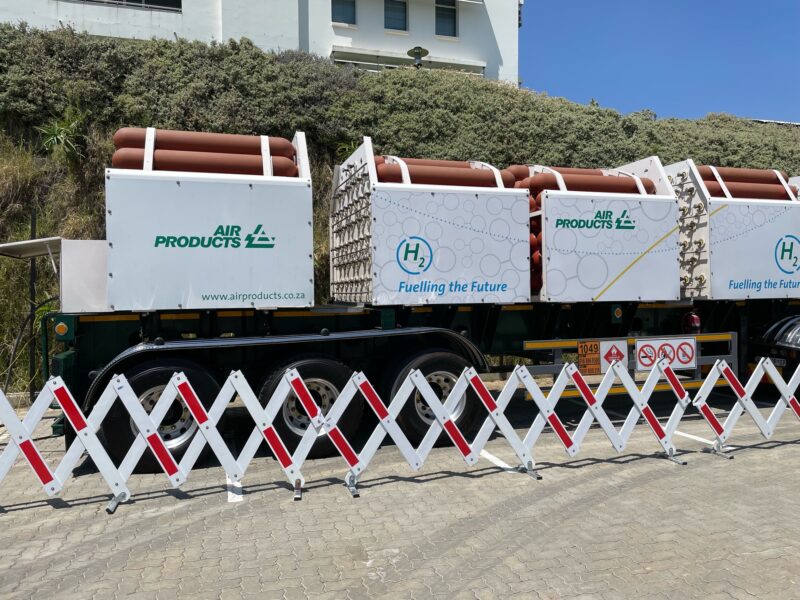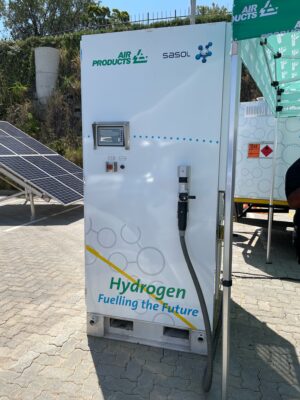Sign up for daily news updates from CleanTechnica on email. Or follow us on Google News!
South Africa is the world’s largest producer of platinum group metals. Anglo American Platinum is the world’s leading primary producer of Platinum Group Metals (PGMs). Platinum is used in a variety of applications, including auto catalytic converters, fuel cells, air and water purification units, heart pacemakers, computer screens, hard disks, and fertilizers. As the transition to battery-electric vehicles accelerates in may parts of the world, there will be a drop in demand for catalytic converters that are needed for emissions purposes in internal combustion engines.
Platinum is a key component in proton exchange membrane (PEM) fuel cells. A paper by R.J. Spiegel says that PEM fuel cells have a host of advantages, including low operating temperature (∼80 °C), high current densities, fast start capability, no corrosive fluid spillage hazard, low weight, small size, and potentially inexpensive to manufacture.
Anglo American has also been exploring the green hydrogen economy beyond just the transport sector applications. In partnership with EDF Renewables, its Envusa Energy is working to develop a regional renewable energy ecosystem (RREE) in South Africa. The roll-out of the RREE will also serve as a clean energy source for the production of green hydrogen for Anglo American’s nuGen™ Zero Emission Haulage Solution (ZEHS) — a planned fleet of hydrogen-powered ultra-class mine haul trucks — significantly reducing on-site diesel emissions towards a carbon neutral future while also supporting the development of South Africa’s Hydrogen Valley.
Anglo American is now stepping up its partnerships in the green hydrogen economy. Late last year, BMW Group, Anglo American Platinum, and Sasol announced a collaboration to drive the green hydrogen economy with the launch of a pilot fleet of hydrogen vehicles in South Africa. We now have an update on this. Yesterday, Anglo American Platinum, BMW Group South Africa and Sasol together launched the first trial of a pilot fleet of BMW iX5 hydrogen fuel cell electric vehicles in South Africa.
The public road vehicle trial was announced on the sidelines of the Hydrogen Council’s Regional Meeting held for the first time in Africa, in Sandton, Johannesburg, on the 12th and 13th of February 2024. In terms of the collaboration, the companies each provide a unique part of the value chain to demonstrate their capabilities in this rapidly emerging new economy. With the BMW iX5 Hydrogen, the BMW Group says it has introduced the world’s most powerful passenger hydrogen fuel cell electric vehicle (FCEV). The small series fleet is being used around the world to gain valuable insights into the operation of hydrogen FCEVs and customer experience.

Peter van Binsbergen, CEO of BMW Group South Africa, said at the Hydrogen Council’s Regional Meeting and at the launch of the BMW iX5 Hydrogen pilot fleet in South Africa that, “collaboration across industries would be key to unlocking the huge potential of green hydrogen as a critical technology in the decarbonisation challenge.”
Van Binsbergen continued: “This is why we have partnered with Anglo American Platinum and Sasol to bring the BMW iX5 Hydrogen fleet to South Africa. We see Hydrogen as the ‘missing piece’ of the energy transition puzzle and, in the transport sector, it has the potential to become another pillar in the BMW Group’s drivetrain portfolio for local CO2-free mobility, alongside our established battery-electric mobility option.”
 Dr. Juergen Guldner, BMW Group General Program Manager Hydrogen, said: “After four years of development, the pilot fleet of BMW iX5 Hydrogen started its world tour in Antwerp, Belgium in 2023. Since then, we have showcased and tested these prototypes all over the world and see hydrogen cars as a good complement to our successful battery electric vehicles, not a competition between the two technologies. Since hydrogen cars combine the advantages of electric driving with the possibility to refuel quickly, they would be ideal for customers who travel a lot or who do not have electric charging at home or at work.”
Dr. Juergen Guldner, BMW Group General Program Manager Hydrogen, said: “After four years of development, the pilot fleet of BMW iX5 Hydrogen started its world tour in Antwerp, Belgium in 2023. Since then, we have showcased and tested these prototypes all over the world and see hydrogen cars as a good complement to our successful battery electric vehicles, not a competition between the two technologies. Since hydrogen cars combine the advantages of electric driving with the possibility to refuel quickly, they would be ideal for customers who travel a lot or who do not have electric charging at home or at work.”
Prakashim Moodliar, Head of Projects at Anglo American Platinum, said: “As Anglo American Platinum, we believe partnerships are key to creating a local, sustainable hydrogen economy. Our Platinum Group Metals (PGMs) will play a strategic role in enabling a new industrial sector in the country and globally. In 2023 we announced our partnership with BMW Group South Africa and Sasol to bring green mobility to SA. This week’s engagements represent a clear and continued demonstration of a green mobility ecosystem in action, which showcases the most powerful passenger fuel cell electric vehicle. The future is hydrogen.”
 Dries Swanepoel, Principal Specialist Market Development at Sasol’s Low Carbon Energy Solutions business, said: “Sasol is very excited about our partnership with Anglo American Platinum and BMW Group South Africa to develop a local green economy. BMW’s iX5 Hydrogen fuelled with Sasol’s hydrogen dispensed using Air Products technology is a powerful expression of thought leadership and innovation in action. Together, we are making strides towards introducing the concept of hydrogen mobility in South Africa and building the ecosystem of partners needed to do this. The central tenet to these strategic partnerships, proof-of-concept demonstrations and pilot projects is collaboration. Our joint effort is strong testament to what can be accomplished when diverse sectors come together to address one of the world’s most pressing challenges.’’
Dries Swanepoel, Principal Specialist Market Development at Sasol’s Low Carbon Energy Solutions business, said: “Sasol is very excited about our partnership with Anglo American Platinum and BMW Group South Africa to develop a local green economy. BMW’s iX5 Hydrogen fuelled with Sasol’s hydrogen dispensed using Air Products technology is a powerful expression of thought leadership and innovation in action. Together, we are making strides towards introducing the concept of hydrogen mobility in South Africa and building the ecosystem of partners needed to do this. The central tenet to these strategic partnerships, proof-of-concept demonstrations and pilot projects is collaboration. Our joint effort is strong testament to what can be accomplished when diverse sectors come together to address one of the world’s most pressing challenges.’’
Platinum group minerals account for almost 40% of South Africa’s annual mineral sales, contributing to close to 180,000 jobs as well as $20 billion dollars in annual sales. When we talk about a transition, we should factor in how this will play out for industries such as the platinum industry that feeds into catalytic converters that won’t be needed in the same volumes as before as the shift to BEVs accelerates. It is therefore easy to see why firms in the platinum industry are actively working to find viable pathways for scaling applications in other use cases such as fuel cells for application in the transport sector as well as in the broader energy ecosystem.
Conversations around hydrogen for transport applications divide opinion in a big way, however it could be worth a deeper look into potentially feasible applications for places such as South Africa that have a big platinum industry. Not all applications will work out, especially for smaller vehicles where BEVs have taken the lead due to unparalleled energy efficiencies, however, could there be other areas where it makes more sense? Let us know what you think in the comments section.
Images courtesy of Hideki Machida
Have a tip for CleanTechnica? Want to advertise? Want to suggest a guest for our CleanTech Talk podcast? Contact us here.
Latest CleanTechnica TV Video
I don’t like paywalls. You don’t like paywalls. Who likes paywalls? Here at CleanTechnica, we implemented a limited paywall for a while, but it always felt wrong — and it was always tough to decide what we should put behind there. In theory, your most exclusive and best content goes behind a paywall. But then fewer people read it!! So, we’ve decided to completely nix paywalls here at CleanTechnica. But…
Thank you!
CleanTechnica uses affiliate links. See our policy here.




